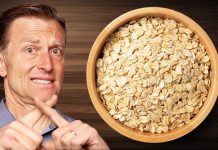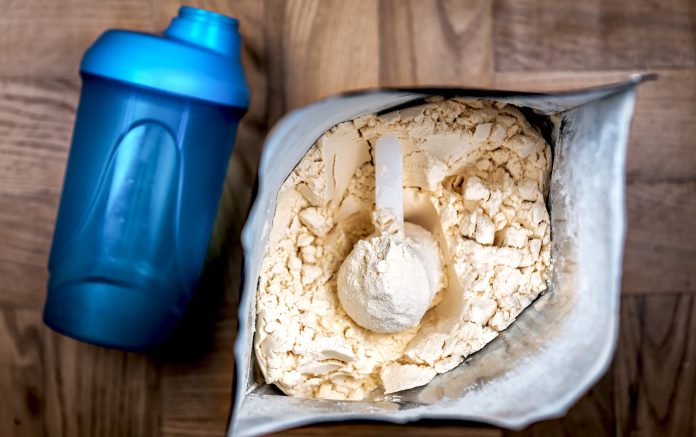The fact that something called protein powder even exists tells you just how much people love protein. And for good reason: As a part of literally every cell in the human body, this macronutrient is integral to functions like our immune response and hormone production, according to the Food and Drug Administration (FDA)—as well as, most famously, building and repairing our body’s cells and tissues.
So yeah, it makes a certain amount of sense that people are forever concerned they need to get more of the stuff. (Also see: the golden age of protein bars, the rise of plant protein, and the existence of products like protein chips and protein water.)
Protein also seems to be the only macro that doesn’t regularly get shit on by diet trends. “Our food culture in the United States seems to be fascinated with high-protein diets and products,” Whitney Linsenmeyer, Ph.D., R.D., nutrition and dietetics instructor in the Doisy College of Health Sciences at Saint Louis University and spokesperson for the Academy of Nutrition and Dietetics, tells SELF.
Maybe the clearest sign of our protein devotion is the belief that to properly and fully repair our muscles and maximize the benefits of our gym time, we need to supplement our diets with concentrated protein—not to mention the collective billions of dollars we shell out each year on protein powder.
But how well-founded is that assumption? How necessary is protein powder, actually?
Here’s how much protein most people need.
If you’re downing protein shakes, you’re most likely doing it because you think you need more protein in your life. So let’s first talk about how much protein you in fact need.
The amount of protein you should be getting each day varies based on factors like age, sex, health, and activity level, according to the U.S. National Library of Medicine. But for a baseline we can use the recommended daily allowance (RDA), which is based on the average amount of protein determined to meet the nutrient requirements of 97% to 98% of healthy individuals: 0.8 grams of protein per kilogram of body weight per day. (That’s approximately 0.36 grams per pound. Don’t ask me why guidelines developed for people living in this country use the metric system! Because IDK.)
That means that a 150-pound person needs around 54 grams of protein per day, while a 200- pound person needs around 72 grams of protein a day. Based on those guidelines, most people already get enough protein from their diets, per the U.S. National Library of Medicine. If you have roughly zero idea how much protein you typically eat per day, here are a few examples of the amounts you can find in some common foods: a 4-ounce chicken breast has 27 grams, a cup of lentils has 17 grams, two large eggs have 12 grams, and two tablespoons of peanut butter have 7 grams.
But if muscle gains are your goal, here’s how much protein you need per day.
So we know how much protein most people need, but maybe you’re not most people. You’re you, and the optimal amount of protein for any one individual depends not only on their biology and lifestyle but what their goals are, Adam M. Gonzalez, Ph.D., C.S.C.S., assistant professor in the Department of Health Professions at Hofstra University, tells SELF.
A lot of people who drink protein shakes do so because they heard it’s great for making maximal #gains at the gym—or, in scientific parlance, for optimizing muscle protein synthesis (MPS, for short). Generally speaking, people who are trying to maintain and build muscle through diet and exercise benefit from getting more protein than the RDA, Gonzalez says.
How much more depends not just on who you are but also who you ask. The Academy of Nutrition and Dietetics (Academy), Dietitians of Canada (DC), and the American College of Sports Medicine (ACSM) reached a consensus, after reviewing the research on sports nutrition, that the optimal daily protein intake for active adults and athletes is 1.2 to 2 grams per kilogram of body weight, or 0.5 to 0.9 grams of protein per pound). The International Society of Sports Nutrition (ISSN) came up with a similar number. It recommends 1.4 to 2 grams of protein per kilogram of body weight a day (or 0.6 to 0.9 grams of protein per pound) for most people who are exercising with the goal of building and maintaining muscle mass and strength.
Let’s say you’re someone who exercises with the goal of building muscle and you want to make sure your protein intake helps with that. Combining those two recommended ranges, a 150-pound adult should be getting anywhere from 75 to 135 grams of protein per day, while a 200-pound adult should be getting anywhere from 100 to 180 grams of protein a day. The more strenuous (intense and long) your workouts, the more repair your muscles need to rebuild and grow, and the higher in the recommended range you’ll fall, Gonzalez explains.
Yeah, that’s a lot of protein. For a 150-pound adult, that’s an extra 21 to 81 grams of protein per day. It’s certainly not impossible to get all of that from your diet, but it also might not be the easiest or most palatable thing for some people.
So does it matter if you get your protein from powder or from food?
Deciding whether you legit need protein powder is pretty simple. We just addressed the first question: how much protein you need. The second question is: How well is your diet meeting those needs?
Whether or not you need protein powder “really depends on what your diet consists of already,” Gonzalez says. Most people can indeed get enough protein, powder-free. “For the average healthy person who’s pretty athletic and eating a balanced, diverse diet, they’re probably getting enough protein from their food already,” Beth Kitchin, Ph.D., R.D.N., assistant professor in the UAB Department of Nutrition Sciences, tells SELF.
“It is absolutely possible to consume adequate protein from real food,” adds Linsenmeyer. “Meat, fish, poultry, eggs, dairy, beans, lentils, soy products, nuts, seeds, whole grains—[they] all provide dietary protein.”
Real food also has a couple advantages over powder. It can certainly cost less, given some protein powders can cost you a pretty penny. (Though this depends on how much you spend on the food you eat in place of the powder, of course.)
The main benefit is what you automatically get alongside the protein. “The plus with foods is that you are able to consume a variety of other micronutrients and fiber from a full meal,” Yasi Ansari, M.S., R.D., C.S.S.D., National Media Spokesperson for the Academy of Nutrition and Dietetics and Assistant Director of Performance Nutrition for UC Berkeley Athletics, tells SELF. This is especially important if you’re drinking a high-protein, low-everything-else shake to replace a well-rounded meal that would normally fuel your body with carbs and fat along with that protein. “I have found people will rely more on these shakes, rather than taking the time to prepare and meal plan for a balanced diet,” Ansari says. (Although, to be fair, you can certainly mix in real foods—berries, peanut butter, spinach, flax seed, yogurt—to your smoothie and get the best of both worlds.)




























